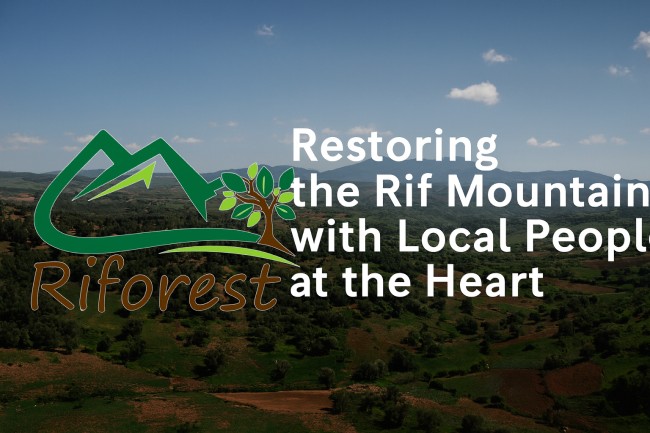Riforest: Restoring the Rif Mountains with Local People at the Heart

The Rif Mountains of northern Morocco are breathtaking—and burdened. Decades of soil exhaustion, water stress, and economic hardship have left many smallholders struggling to make a living from degraded land. Riforest steps into this landscape with a simple, practical creed: restore the land with the people who live on it. This small, impact-driven foundation combines permaculture design, hands-on training, and material support to help farmers rebuild healthy soils, reliable harvests, and dignified livelihoods. In other words, riforest is both a name and a promise: to re-green, renew, and regenerate.
What Is Riforest?
Riforest is a Dutch foundation based in Zeist, Utrecht, working shoulder-to-shoulder with communities in the Rif Mountains. Founded in 2017, the organisation operates at a deliberately human scale—typically two to ten staff and associates—so it can remain responsive to local realities rather than imposing one-size-fits-all blueprints. It focuses on environmental quality programmes that directly improve soil health, water availability, biodiversity, and farm incomes. Crucially, the team believes ecological restoration must make economic sense for families; without income resilience, restoration isn’t durable.
Mission and Vision
The mission is clear: restore degraded agricultural land ecologically, with and for the locals. The vision that flows from this is both ecological and social—an upland region where smallholders can farm sustainably while improving their quality of life. Riforest stimulates and supports farmers to adopt practical, low-cost techniques that build fertility, reduce erosion, and diversify production. From fruit and nut trees to composting and rainwater harvesting, the foundation’s approach turns marginal plots into productive, climate-resilient agro-ecosystems. The long-term aim is self-reliance: local knowledge, local materials, and local leadership driving change long after a project’s seed funding ends.
Why the Rif Mountains Matter
The Rif is a fragile mosaic of steep slopes and patchwork fields. Historic deforestation, ploughing on gradients, and irregular rainfall have depleted soils and pushed farmers towards short-term coping strategies. Yet the region possesses extraordinary potential: a Mediterranean climate that suits olives, figs, almonds, pomegranates, and a host of aromatic plants; diverse native species; and a deep culture of land stewardship. By rebuilding vegetation cover and water cycles, riforest helps turn susceptibility into strength.
How Riforest Works: From Permaculture to Community Training
Riforest applies permaculture as a practical toolkit—designing farms to mimic the efficiency and diversity of natural ecosystems. This is not theory for theory’s sake; it’s a set of steps farmers can implement season by season, plot by plot.
Permaculture Principles in Practice
The foundation champions multi-storey planting—trees, shrubs, herbs, and ground covers layered to capture sunlight at different heights, protect soil, and create microclimates. Hedge lines slow wind and trap moisture; contour plantings and swales reduce runoff and recharge groundwater. Tree crops like olives and almonds anchor the system, while nitrogen-fixers and mulch plants feed the soil. The result is a living infrastructure that grows more fertile with time, cutting dependence on costly external inputs.
Material Support and Knowledge Transfer
Many farmers know what would help but lack the resources to act. Riforest bridges that gap through material support—quality seedlings, simple tools, and composting kits—paired with knowledge transfer. Field workshops cover pruning, grafting, integrated pest management, and compost creation. By demonstrating techniques on pilot plots and farmer-to-farmer “learning chains”, the organisation ensures methods spread organically within villages. This is not charity; it’s capability building.
Water Management and Soil Health
Water is the heartbeat of the Rif. Riforest promotes catchment-aware design: small earthen bunds, stone lines, and swales that slow water, spread it across the slope, and sink it into the soil profile. Mulch and living ground cover then lock in that moisture, suppress weeds, and feed soil life. Composting and on-farm organic matter recycling turn waste into fertility, enhancing the soil’s sponge-like capacity. Over time, farmers see cooler soils, steadier yields, and fewer crop failures in dry spells.
Programmes and Impact
Riforest’s programmes are designed to produce tangible, compounding benefits—ecological, social, and economic.
Food Forests and Agroforestry
A flagship intervention is the establishment of food forests—polycultures of perennial trees and companion plants arranged for year-round productivity. Unlike monocultures, food forests build resilience through diversity: if one crop has a poor year, others compensate. Families gain fruit, nuts, herbs, forage, and firewood from a single, carefully planned area. Agroforestry rows can also be integrated into existing fields, sheltering annual crops while adding long-term value via timber or nut harvests.
Biodiversity and Climate Benefits
As vegetation returns, birds, pollinators, and beneficial insects follow. Biodiversity isn’t decoration; it is the engine of pest control, pollination, and nutrient cycling. Each additional layer of plant life increases carbon stored in biomass and soil, making ecological restoration a climate solution as well as a livelihood strategy. On sloping lands, plant roots stitch the soil together, decreasing erosion and keeping vital topsoil on the farm rather than in the river.
Education and Local Leadership
Riforest invests in education at every step—short courses, field days, and mentoring that empower local champions. Young people gain skills that open pathways to green jobs; experienced farmers become trainers for their neighbours. This creates a virtuous cycle: as competence grows, so does confidence, and communities start leading their own restoration journeys. The foundation’s role then shifts from initiator to facilitator.
Essential Facts at a Glance
-
Website: https://www.riforest.nl
-
Phone: 06 2827 9987
-
Headquarters: Leeuweriklaan 28, Zeist, Utrecht, 3704 GR, Netherlands
-
Founded: 2017
-
Industry: Environmental quality programmes
-
Specialties: ecologie, permacultuur, landbouw, biodiversiteit, watermanagement, vergroening, verduurzaming, composteren, educatie
Why Riforest Stands Out
Plenty of projects talk about sustainability; riforest operationalises it. Three qualities set the foundation apart. First, locality. Programmes are co-designed with farmers and tailored to specific microclimates and cultural practices, ensuring adoption and longevity. Second, frugality. The team prioritises low-cost, low-tech solutions that farmers can maintain without expensive inputs; resilience should not depend on imported goods. Third, systems thinking. By weaving together soil, water, plants, animals, and people, riforest designs farms as ecosystems. This is why yields grow steadier, risks fall, and landscapes become visibly greener with each passing year.
Riforest also values transparency and measurable outcomes. Rather than counting saplings planted and calling it a day, the foundation looks for survival rates, soil improvements, water retention, and household income changes. This shifts the focus from activity to impact. A tree that dies after the photo op is not a success; a tree that thrives for decades—and anchors a productive understory—changes a family’s prospects.
How You Can Help
If you care about practical climate action, biodiversity, and rural opportunity, supporting riforest is a high-leverage choice. Individuals can contribute funds, share expertise, or volunteer time for remote mentoring and educational content. Businesses can sponsor specific interventions such as tree nurseries, rainwater harvesting lines, or community training series. Educators can fold riforest case studies into courses on agroecology, climate resilience, or sustainable development, helping to spread lessons learned across regions with similar challenges.
Most importantly, you can amplify the story. Share the idea that restoration is most durable when it is community-led, low-cost, and designed to fit the land. The Rif Mountains are not unique in their pressures; from the Mediterranean basin to drylands worldwide, smallholders face similar realities. The techniques refined by riforest—permaculture design, composting, water harvesting, agroforestry—are transferable, adaptable, and scalable. When local knowledge and ecological design meet, landscapes recover.


